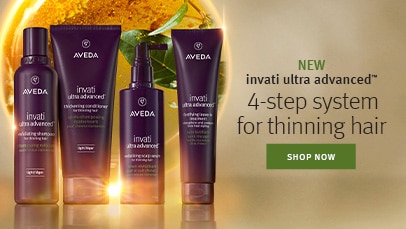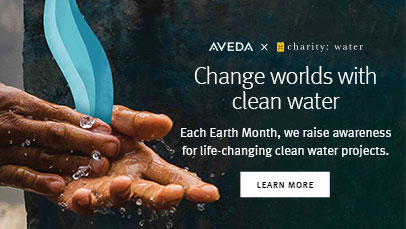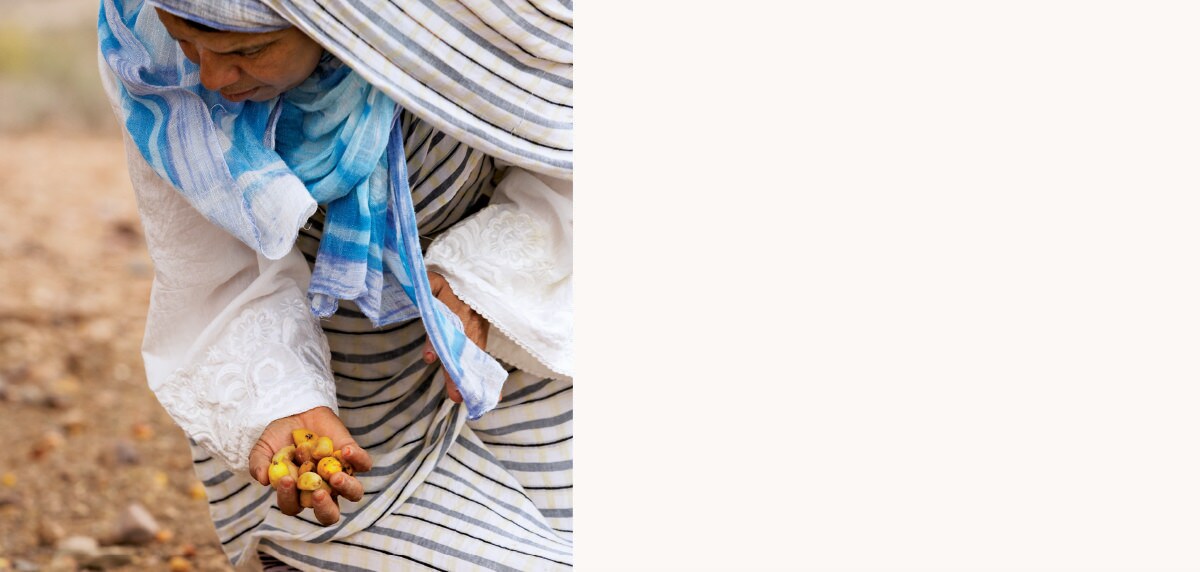SECTION 3 ENVIRONMENTAL LEADERSHIP, NOT JUST IN THE WORLD OF BEAUTY, BUT AROUND THE WORLD
Our Mission at Aveda is to care for the world we live in, from the products we make to the ways in which we give back to society. At Aveda, we strive to set an example for environmental leadership and responsibility, not just in the world of beauty, but around the world.
From our founding in 1978 to today, Aveda has taken a global perspective on its business and its responsibility to care for the planet. Our business success is based on healthy ecosystems and robust economies that support the plants and the communities that provide many of the raw materials for our products. In implementing the Aveda Mission, we look to care for the places that we touch whether they are where we live and work or they are the homes and regions that are part of our global supply chains and Aveda network.
“One Voice, One World” Petition to Global Leaders at Climate Conference
In autumn 2015, Aveda partnered with the National Audubon Society to raise awareness around the importance of protecting birds and people from climate change. According to their Audubon Birds and Climate Change Report, nearly half of the North American bird species could be imperiled by shrinking and shifting ranges caused by climate change.
Aveda and Audubon launched a petition called ‘One Voice, One World’ which educated our Aveda network, employees and guests on the serious impact our warming planet has on birds, and invited them to voice their concern to be shared with world leaders at the COP21 United Nations climate conference in Paris. Over 27,000 signatures were collected from 76 countries and delivered to leaders requesting their commitment to build a better world for birds and people through clean air, clean water, clean energy and healthy, natural spaces.
Lokta Bark Paper—Getting It Right
In our 2013-2014 ECC Report [include link]), we described our decade long purchases of lokta bark paper for holiday gift set boxes through Himalayan Bio-Trade Pvt. Ltd (HBTL), the processing and marketing agent for a consortium of community-based forest product enterprises in Nepal. These purchases helped increase food security for over 2,400 families and better provide for their families’ futures. We had been steadily increasing purchases, but in 2015 bumped up against circumstances that occasionally happen when a supply relationship is based on lead times as long as two years. Gigi Abbadie, Aveda’s Global Marketing Executive Director for Brand Mission, Gifting & Institutes, picks up the story with Dave Rapaport, Vice-President for Earth and Community Care:
Gigi: “We originally got started with lokta paper as a result of our partnership with the Asia Network for Sustainable Agriculture and Bioresources (ANSAB) and EnterpriseWorks/VITA, a division of Relief International. With funding from USAID, these groups sought to conserve biodiversity in western Nepal by promoting profitable, conservation-based management of the area's forest and pasture resources. Bark collected in 2006 was delivered to vendors in 2007 and made into boxes that Aveda purchased in June of that year for use with the holiday season gift sets.[1]”
“What began as a small program slowly grew into substantial purchases of 300,000 sheets of lokta bark paper by our box vendor. Because we based our box purchases on forecasts made nearly two years in advance of the holiday season in which the gift sets would be sold, we found ourselves in a situation where we forecasted a need for 394,000 sheets in fiscal year 2014 in anticipation of sales growth in the fiscal year 2016 holiday season. However, the intervening holiday season sales did not meet forecasts and, consequently, we found ourselves with an excess of inventory of paper and boxes, which we used to make gift sets in 2015, and we reduced our new box purchases to just 105,000 sheets, nearly a 75% reduction.”
Dave: “We don’t purchase lokta paper directly from HBTL, but we work with HBTL to identify how much paper is needed to make the boxes we will purchase from our box supplier. We’d like to be able to purchase directly, but doing so is difficult for small, community-based suppliers that are not experienced with our Code of Conduct requirements (see section 1 on ELC COC [link]) and do not have extensive resources available to go through the long and tedious process of becoming a certified vendor in the Estée Lauder Companies system. That system is very valuable in helping us meet our Mission commitments, but we recognize that it creates some complexities in how we do things with our supply chain.”
“What might otherwise be a straightforward business decision to cut purchases to match sales became a source of concern that we would damage communities that had made strides to improve their quality of life and continue to depend on Aveda for the vast majority of their business. After a lot of discussion, we decided to donate $200,000 to HBTL[2] that would be an advance on a future purchase and we set in motion training to get certified by Institute of Marketecology (IMO) for their Fair for Life fair trade program as a way to get experience that would be useful in becoming certified as an Estée Lauder Companies supplier.”
“We are dedicated to maintaining a long term and mutually beneficial relationship with HBTL and the communities that source and manufacture lokta bark paper, and have signed what we believe is a first-of-its kind formal Letter of Intent (LOI) from a global brand to a community sourcing partner to ensure that Aveda does not inadvertently undermine the progress made through our purchases with large fluctuations in our demand. The LOI captures in writing our intent to provide timely and accurate forecasts of demand for lokta bark paper and establishes our commitment to limit any decline in purchasing to a maximum 25% decrease from previous year purchases. This would effectively create a “soft landing” over multiple years and enable communities to plan if we were to ever have to end our use of their paper.”
Gigi: “We’ve also been working very hard to increase our use of lokta bark paper by creating notebooks for our sales meetings and testing various products including notecards and a gratitude journal in a few of our retail stores. We rolled these out in 2016 to all Aveda retail stores supplementing our purchases via the gift set boxes. We also worked with our packaging experts, Deb Darling and Nicole Call to redesign the gift box to reduce the cost, to improve its aesthetics, and to make it easier to assemble and to reuse. In addition, three new bags were developed for use in Aveda retail stores that incorporate the lokta bark paper and we are producing the box in three colors for the 2017 holiday season. We’ve got a long-term strategy for increasing our use that we think is viable.”
Dave: “It’s not a good thing that Aveda has been the major user of lokta bark paper; we purchase 90 to 95 percent of what’s produced. It’s our responsibility to help HBTL expand its market and we’re doing that by helping them attend trade shows, educating them about global markets for their products, and working with the Global Greengrants Fund to use some of the money raised during Earth Month to pay for water system improvements that not only provide drinking water, but also support the development of agricultural products, and possibly the manufacture of charcoal briquettes sold for cooking stove use. Going forward, we are looking to HBTL to grow in its ability to become a supplier to a variety of companies as we continue to be a partner with them in business and in helping the communities to prosper.”
Gigi: “Aveda’s commitments to the Nepal communities where we work extend beyond biodiversity conservation and economic stimulation. Following the 2015 earthquake affecting nearly 30% of Nepal’s population, Aveda quickly donated water-related emergency relief funds from our Donor Advised Fund with Global Greengrants, and continued to raise money in 2016 through the sale of our Renewal for Your Journey gift sets. These sales raised $123,000 for earthquake recovery via Global Greengrants. When added to generous gifts from Aveda guests, total Aveda network donations reached $150,000 in 2016.”
Vanuatu
The Republic of Vanuatu, translated as “Our Country Forever,” is a South Pacific Ocean nation made up of roughly 80 islands lying north to south along the Coral Sea between the Solomon Islands and Fiji. Vanuatu boasts a robust cultural vitality with more than 120 languages actively spoken, but is also considered one of the poorest places in the world. Ninety percent of the nearly 280,000 inhabitants live in rural areas, making a living as subsistence farmers, artisanal harvesters, and fishermen.
Dave Rapaport, Vice President of Earth and Community Care, and John Frankenfield, Director of Indigenous Raw Materials, Organics, and Essential Oils, share how Aveda is helping the native people of Vanuatu trade local resources sustainably without endangering their unique culture and way of life.
Dave: “We source two types of oils from Vanuatu that are pressed from the nuts of tamanu and nangai trees. Tamanu is a functional botanical ingredient and has been used for centuries in India and other places for its healing properties. Aveda uses it in the Outer Peace™, Aveda Men Pure-FormanceÔ, and Smooth InfusionÔ product lines. The nangai nut has some characteristics similar to macadamia nuts and while it has long been used for food in Vanuatu, attempts to export it as a food were not successful. The use of nangai oil in the beauty and cosmetics industry is relatively new, and will be available in Aveda’s Damage Remedy™ Split End Repair starting in 2017.”
John: “I source a lot of the botanical ingredients for Aveda and travel to the areas where they are grown. On my first trip to Vanuatu, I was hesitant and concerned about the possibility of encountering an exploitative situation for the remote villagers, but I quickly learned that business like this is a valuable opportunity for the local people to earn revenue for basic necessities like healthcare, food and clothing. Medical care was traditionally hard to find. They had to travel two to three boat rides away to a different island, which cost money they didn’t have. Due to the small-scale of the cash economy in Vanuatu, any new revenue streams for the community can be particularly meaningful.”
“Indigenous groups that we do business with benefit financially and through technical assistance. And because the nuts are harvested from native trees that do not require watering and are not cut for timber, these oils are sustainable. The advantage for Aveda to source from places like Vanuatu is our ability to positively influence the health of the Earth and the health of local communities, two things we care about very much. Aveda is committed to teaching local communities how to sell specific commodities to us and to others.”
Dave: “We are able to access these oils thanks to a supply chain of caring partners. Alain Jacobé, whose family started Tebakor Island Products Ltd., a processing company and exporter in Vanuatu, grew up on the island of Malekula where the oils are sourced and knows the people very well. He works to bring economic development opportunities to these remote villages and spends about three months of the year organizing the communities to collect, dry and transport the nuts and oil.”
“After the nangai nuts are hand-picked from wild trees they are dried in newly installed solar dryers. These small built-in place units are owned by Tebakor, but operated by the villagers free of charge. Each nasara (extended family or clan from their own section of the village) is assigned a week to harvest and dry nuts, a process that complies with the ILO Declaration on Fundamental Principles and Rights at Work and local Vanuatu laws. The dried nuts are bagged and sent to Tebakor’s processing facility where they are pressed into oil. The work for the local inhabitants isn’t significant in scope, but it’s an important contribution to their livelihoods. In addition to paying individual villagers for the nuts they gather, Tebakor also makes a payment to the village for collective needs, such as the construction of a community kitchen used for festivals.”
John: “Cindy Angerhofer, Aveda’s Executive Director of Botanical Research, travels around the globe looking for potential raw materials in remote indigenous regions. When she finds a possible source, we need a skilled interface with technical capabilities for quality assurance and direct relationships with the local community to help bring production processes to scale and to manage logistics in conditions where humidity and potential contamination are critical concerns. In 2008, we started working with Concentrated Aloe Corporation (CAC), a Florida-based company that develops strong supply chains with a focus on product traceability and organic certification. The small indigenous communities of Vanuatu are able to provide consistent quality and supply, something that’s difficult even for advanced and large industry players, thanks to CAC. Each raw material shipment to Aveda must conform to stringent corporate quality and purity standards before it can be used. CAC has been an essential partner in our supply chain because of their success working in developing countries and bringing sophisticated laboratory processes to indigenous products. This is something locals can’t do alone.”
“As a customer, I don’t want to be the supplier’s only buyer. By partnering with a supplier like CAC we can prevent the sourcing risks and uncertainties in demand and supply of materials. A robust supply chain with several customers ultimately protects the harvesters. And Aveda can have more confidence that raw material supply shortages will be minimized.”
Dave: “Beyond providing a source of income to the local communities and enhancing the economy we are also working with Global Greengrants Fund (GGF) to extend the benefits of our trading relationship by supporting projects to supply drinking water in two villages and help them protect coastal resources critical to their survival.”
Island Reach operates a mobile conservation work platform aboard their research vessel Llyr in Vanuatu, working to build links and direct-action plans from ridge-to-reef that protect watersheds and reef ecosystems while strengthening community resilience and capacity for climate change adaptation. A series of grants from GGF is funding this work in the villages along the coast of Malekula where Aveda sources the tamanu and nangai nuts.
GGF grants have also been used to help fund rainwater catchment systems to provide drinking water in two of the Malekula villages, where the only available water sources had been contaminated shallow wells and springs located very far away. These projects were done by New Zealand-based Children’s Health and Education Trust, which has worked in this part of Vanuatu to address concerns such as lack of clean water, basic sanitation, changing weather patterns, and the risks that climate change poses on local water sources in Vanuatu. Their successful projects include the installation of a solar powered desalinization plant, teaching local women to make and sell palm soap, and training men in building water systems and rainwater collection tanks.
“We have high hopes for the financial benefits the local people will see from new and growing trading relationships such as tamanu and nangai-based products, but we also know that the path to sustained profitability won’t be easy. Opportunities depend on vagaries of the marketplace and market prices. We will continue to pursue a series of successful products over time with the intention to indirectly strengthen Vanuatu’s economy and improve their quality of life.”
John: “Just like all businesses, we have to make money. There are easier ways to make money than to invest in indigenous communities, but we believe this way is more genuine and far more rewarding. It’s woven into the fabric of the way we do business and our mission. It’s not a marketing strategy; it’s critically important to Aveda and to our culture.”
Yawanawa—Building Capacity in the Supply Chain
Our relationship with the Yawanawa goes back to 1992, when Aveda’s founder, Horst Rechelbacher met Biraci “Bira” Brasil, the chief of the Yawanawa tribe, at the 1992 Earth Summit in Rio de Janeiro. Historically a nomadic tribe, the Yawanawa evolved into an agrarian community. With Aveda’s support, they began growing uruku (Bixa orellana), which is the source of urukum, better known as annatto, an orange-red pigment derived from the seeds of the plant, which is widely used in food, cosmetics and other products as a colorant and flavoring.
The Yawanawa had traditionally used wild-harvested uruku to paint their bodies and faces for ceremonial purposes. The new trading relationship required them to learn how to cultivate uruku in village gardens, and as they became successful they were able to add a variety of subsistence food crops to their gardens. However, the Yawanawa had difficulties getting the dried seeds into the supply chain at a consistent quality and as a result were only able to provide an uncertain amount of urukum. Dave Rapaport, Aveda’s Vice President for Earth and Community Care commented on the recent developments that allowed them to attain the consistent quality required by Aveda:
Dave: “Our relationship with the Yawanawa has long been an example of how we use our resources to achieve both commercial and non-commercial goals. Aveda has supported the Yawanawa with grants to help them maintain their traditional culture and to establish a means for a self-sustaining economy. We have also been an indirect customer for uruku seeds, which are processed to get two uruku colorants that we use in several products. After becoming aware of the quality problems, we asked one of our key suppliers, Beraca, to see if they could help the tribe improve the quality of the uruku seed they deliver so that Aveda could consistently use it.”
“Working with Beraca and a sustainable agriculture consultant who had previous experience in the Yawanawa community, we found that the biggest sources of the quality problems were the storage of the seeds and long shipping times. Partly because of the conditions in the village and partly due to difficult transportation logistics, the seeds ended up sitting in storage and being in transit long enough to end up damaged in the tropical climate. Based on these insights, we were able to help them take action to solve these problems in part with a solar dryer that could reduce the water content of the seeds to a consistent level and a simple vacuum bag technology that protected the dried seeds from the insects and the humidity. The biggest factor was that they figured out how to shorten the transportation logistics to minimize damage while in transit.”
“Beraca is now been able provide uruku based ingredients with 100% of the seeds again coming from the Yawanawa. While the income earned through selling uruku seeds has always been a relatively minor aspect of our long partnership, we are very pleased that we can maintain a trading relationship, which is symbolically very important to the Yawanawa. ”
Earth Month Internationally
As the largest fundraising campaign during the year, Earth Month attracts participation around the globe. Aveda’s network of salons, spas, Aveda Institutes and Experience Centers, dedicated beauty industry professionals, employees, and guests get creative and bring out their passion to give back. Our partner, Global Greengrants Fund (GGF) is the means by which we engage with nonprofits around the world in the cause of protecting clean water.
GLOBAL PARTNERS 2017 |
|
Bantay Kalikasan | Singapore Environment Council |
Blueflag | Team & Team International |
Environmental Ethics Foundation of Taiwan, China | Utokapat Foundation |
Global Greengrants Fund | WaterAid Sweden |
Oxfam | Viva con Agua de St. Pauli |
Para La Naturaleza | WaterAid Australia |
Plastic Whale | WaterAid Canada |
Raindrop | WaterAid Denmark |
Save the Children Japan | WaterAid United Kingdom |
During fiscal year 2016, our Asian colleagues and friends showcased their imagination for a good cause.
Taiwan, China
“Recycle Your Style” events were held at all Aveda salons and Experience Centers in Taiwan, China in April in the form of an internal competition. Aveda products, marketing materials, or waste containers were used to create accessories or store decorations. The result turned into great talking points to share with guests as a way to share Aveda’s Earth Month efforts. Beautiful necklaces, bracelets and hair decorations were worn by salon staff.
Japan
Catwalks for Water events are held throughout the world. The 2016 event held in Japan (below), was the first-ever Catwalk for Water produced by concept salons in Japan. Held at Yoyogi Park in Tokyo, the event took place during the biggest eco event in the city - Earth Day Tokyo 2016 - and was led by Aveda Japan Purefessional™ Masa Honda. Models showcased the stunning creativity and talent of Aveda Artists and students alike, using old Aveda Shammy Cloths, perming rods, umbrellas, Aveda Hair Color tubes and boxes, and more, all while raising funds and awareness for clean water initiatives.
Minnesota Sustainable Growth Coalition
Aveda has long believed in the power of collaboration to overcome challenges and achieve meaningful common goals within sustainability. We found one such opportunity through the Sustainable Growth Coalition, a group of more than 30 businesses and organizations in the Greater Minneapolis area, aimed at establishing Sustainability leadership in the region. Aveda’s noteworthy contribution to the coalition is to ensure that the broader group strives to do more than take on simple efforts, but instead pushes boundaries, thinks big, and continues to strive for sustainability leadership.
The focus of the group is an old idea transformed into the next frontier in corporate sustainability, a circular economy. Several efforts are underway within the Sustainable Growth Coalition to establish a vision for a circular economy, determine possible steps to achieving it, and develop projects and initiatives that will move Minnesota toward a circular economy. The coalition is initially exploring joint group initiatives that would demonstrate early steps toward circular systems addressing water, energy, and organic waste.
The Coalition builds on a long interest in sustainability among its members, many of whom are members of other industry groups with a similar focus. The concept of circular systems is a significant topic for number of these groups, especially with the initiatives led by the Ellen Macarthur Foundation on achieving a circular economy that preserves natural capital, maintains resource productivity, and designs out negative impacts on ecosystems and health.
9/11 Business for Innovative Climate and Energy Policy (BICEP)
Aveda joined BICEP, a coalition of businesses advocating for policies to address climate change convened by our long-time partner CERES, in 2013. As part of this commitment, in July 2015, Aveda was one of 365 companies to sign a letter supporting state implementation of the Environmental Protection Agency’s carbon pollution standards that went to more than two dozen governors across the United States. That autumn, BICEP actively worked to demonstrate business support for a strong international action which helped set the stage for the landmark Paris Agreement signed by more than 190 countries in December 2015. Aveda was among hundreds of companies to sign the Business Backs Low-Carbon USA letter to President-elect Trump, President Obama, Members of the U.S .Congress and Global Leaders in November 2016 reaffirming their support for the historic Paris Climate Agreement and the need to accelerate the transition to a low-carbon economy at home and around the world.
Awards
|
| Aveda product recognitions and awards | ||
| In consumer publications | In trade publications | ||
Domestic | 2015 | 11 | 7 | |
2016 | 16 | 5 | ||
International | 2015 | 24 | 6 | |
2016 | 34 | 0 | ||
| 85 | 18 | ||
[1] Because our fiscal year runs from July 1 to June 30, the holiday season that occurs in December 2007 is considered to be in fiscal year 2008.
[2] Because of timing issues, the actual donation was made in fiscal year 2017.








